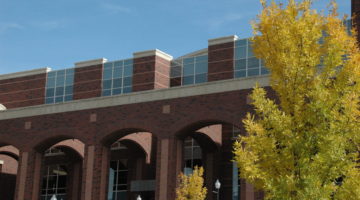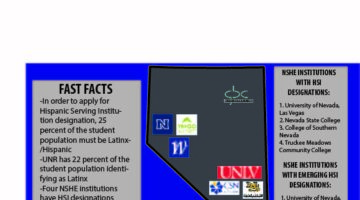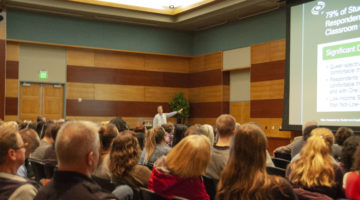In a political climate dominated by racial tension, the University of Nevada, Reno, has dedicated resources to promoting diversity among the campus community. An upward trend in the enrollment of diverse students at UNR has sparked a conversation among faculty and students about how to create a more tolerant and comfortable campus environment for minority students.
In his State of the University speech on Tuesday, Sept. 20, President Marc Johnson reported a growth in the proportions of all students of color from 35 to 36 percent.
“Diversity will receive significant attention this year,” Johnson said. “Over the past several months, our university’s leadership has been actively engaged with our students and student leadership to ensure that our campus remains a safe and welcoming place.”
Johnson said the population of Hispanic students at UNR has increased from 17 percent to 18.5 percent since last year. The university has already begun taking steps toward becoming a more Hispanic-serving institution.
While the number of diverse students has increased significantly in recent years, Blane Harding, director of The Center at UNR, said the number of African-American students on campus still remains far below the other minority proportions.
“We have a very diverse campus; we are probably around 35 percent diverse students or students who self-identify as diverse, yet when you break it down, there is a significant number of Hispanics and Asian Americans. We also have a significant number of biracial students, but when you take a look at the African-American population, it is under 700 students,” Harding said.
In northern Nevada, only 3 percent self-identify as African American. Harding said it is difficult for black students to feel as though they fit in at UNR because a large percentage come from communities with a much larger population of African Americans.
“It is overwhelming to be in a space where people do not look like you,” said Marquis Lawson, a black senior at UNR and the president of Brothers Making a Change. “This is not an initiative where we are trying to separate ourselves. No, we want to help build ourselves and then go out and work with other people.”
Brothers Making a Change was created last fall because a number of students and faculty had a vision of a safe space for black males to express themselves and to communicate with each other. BMAC is a student organization dedicated to helping black males feel more comfortable at the university and to increasing graduation rates of black males at UNR.
The Black Male Initiative program is a nationwide program that was established in 2011 for the purpose of increasing the academic and social success of black male students through interactions between other black male students, faculty and staff.
The national graduation rate for black males in 2013 was 59 percent, significantly lower than the 80 percent of white males who graduated. In Nevada, the group’s graduation rate is 40.2 percent according to the Schott Foundation for Public Education.
“I think graduation rates are so low because there is no organization of this stature on this campus that can help us believe in each other,” Lawson said. “I feel like we don’t get enough support from the university and maybe the reason why is because we are not organized. I believe BMAC will improve graduation rates over time because it has been proven at different universities that have these Black Male Initiatives that their graduation rates have succeeded tremendously.”
Harding is the organization’s adviser and says he plans on bringing in speakers to talk to and encourage the students involved. Harding also hopes to hold sessions with the students to assist them with LSAT and GRE prep, or in whatever path they want to pursue after receiving their degrees from UNR.
“We all have the same goal, no matter if you’re faculty, student or staff, the ultimate goal is to get these kids graduated,” Harding said. “The goal is to make sure they’re comfortable, the goal is to make sure that they know that they are wanted here. We want them here definitely, but we need them here. We need them here as part of the student population. We need to hear their voices, we need to hear their experiences, we need to see them become successful.”
In his State of the University Address, Johnson said the university will be working on a number of initiatives to cater to the growing diversity in student population at the university, such as the hiring of a more diverse faculty.
“As the proportion of our students who are of color increases, our faculty composition must also increase to reflect the student population and to help us all build stronger relationships between students and faculty,” Johnson said.
Lawson said having more professors that looked like the diverse student population would be a good start to creating a safe space where black males can communicate and support one another.
“There is a difference between recruitment and retention,” Harding said. “You can hire them, but you’ve got to make sure you build a community so that they will stay. I think diversifying the faculty is a fantastic idea. The faculty now is around 18 or 19 percent diverse. I think they hired 90-something faculty this semester alone, two were African American and one was Native American.”
Within BMAC, Lawson said he hopes to see a trickle-down effect, with the faculty and professors mentoring the junior and senior members and the junior and senior members mentoring and guiding the new freshmen and sophomore members.












